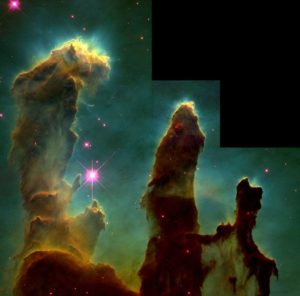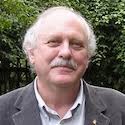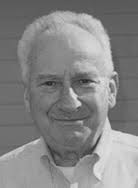Pillars of creation photo: NASA, Jeff Hester, and Paul Scowen (Arizona State University) I keep telling myself that I've said all I needed to say in my first two nonfiction books (Divine Evolution and Counterargument for God) but then I realize that the issue still hasn't been resolved and so the debate isn't over. It's never going to be over, but that doesn't mean I'll be writing nonfiction books and articles rehashing the same points, over and over. When the spirit moves me (literally) I can't let it go. I think there's a third book in the works that will be titled God or Good Luck? Whether or not you understand that fact, those are really your only two choices. Nobel Laureate Werner Heisenberg famously made the most honest and truthful statement about atheism I've ever read: "The first gulp from the glass of natural sciences will turn you into an atheist, but God is waiting for you at the bottom of the glass." What does that mean? It's actually pretty simple. I can speak from experience, because it happened to me. I had graduated from a "Christian" high school that provided a quality education that was careful not to conflict with any biblical teachings. As a result, the first time I ever heard the term "The Big Bang" to describe the origin of the universe was in college. I had not been taught that science believed humans and apes shared a common primate ancestor and had "evolved" from more primitive species as an indisputable fact...it was merely what some biologists believed. I had been taught from the perspective of Young Earth Creationism, and so college … [Read more...]
Calling the wrong guy stupid
Dr. Laurence Moran Laurence A. "Larry" Moran (and no, it's not really Moron) is apparently a pretty smart guy. He holds a PhD in biochemistry from Princeton University and served as a college professor for decades at the University of Toronto. He's probably best known for being one of the lead authors of a textbook called Principles of Biochemistry, although in fairness, his personal blog called Sandwalk also attracts a fair amount of internet traffic, which is how I learned about Dr. Moran--ironically enough, while searching the internet for information on Dr. James Tour. What has inspired me to write about my limited knowledge of Dr. Moran was the conclusion to his article harshly critical of Dr. Tour: I suppose I'm going to be labeled as one of those evil "Darwinists" who won't tolerate anyone who disagrees with me about evolution. I'm actually not. I just don't like stupid people who think they are experts in evolution when they have never bothered to learn about it. Here's my advice to graduate students in organic chemistry: if you want to know about evolution then take a course or read a textbook. And remember, there's nothing wrong with admitting that you don't understand a subject. Just don't assume your own ignorance means that all the experts in the subject are wrong too. [emphasis added]Laurence A. Moran, "A chemist who doesn't understand evolution" Wow. If I'm not mistaken, Dr. Moran just described Dr. Tour as being a stupid person. So I'm wondering, is it possible that a chemistry professor wouldn't know who Dr. Tour is? How could he not know? … [Read more...]
Molecular Biologist Franklin Harold’s thoughts on abiogenesis
Described as "one of the world's most respected microbiologists" on the jacket of his hardcover book in our local library, Professor Franklin Harold of Colorado State University has included some fascinating observations In his book The Way of the Cell on the topic of abiogenesis, or the scientific hypothesis about the origin of life. If one cares about the mini-reviews on the back cover, they would seem to lend credibility to his claim of expertise on the subject, given the enthusiastic endorsement of his book by renowned biologist Lynn Margulis. Dr. Harold appears to be imminently qualified to write about the subject in question. In my opinion, his chapter titled "Searching for the beginning" is so remarkable we should start at its beginning. Professor Harold writes, Of all the unsolved mysteries remaining in science, the most consequential may be the origin of life. This opinion is bound to strike many readers as overblown, to put it mildly. Should we not rank the Big Bang, life in the cosmos, and the nature of consciousness on at least an equal plane? My reason for placing the origin of life at the top of the agenda is that resolution of this question is required in order to anchor living organisms securely in the real world of matter and energy, and thus relieve the lingering anxiety as to whether we have read nature's book correctly. Creation myths lie at the heart of all human cultures, and science is no exception; until we know where we come from, we do not know who we are. [emphasis added]"Franklin Harold, The Way of the Cell Many people who argue … [Read more...]
The childish atheism of Richard Carrier
Dr. Richard Carrier has a PhD in ancient history from Columbia University, but he might be best known for his zealous evangelism for atheism. Dr. Carrier is a historian, not a scientist, yet he is unafraid to wander away from the focus of his professional training to offer opinions on diverse subjects ranging from theology to cosmology and the origin of the universe, or his apparently uninformed thoughts on the chemistry necessary for the origin of life. In a relatively short (11+ minute) video seen by clicking on this link, Dr. Carrier enumerates the following four points to explain why he's not a Christian. His reasons are: God is silent. According to Richard Carrier, God doesn't exist because no messages from this deity have been universally communicated so that every human on earth has a fundamental understanding of what God wants and doesn't want us to do. Dr. Carrier says, "In every culture everywhere, God's gospel would have been preached to them by God Himself, he wouldn't need intermediaries. So we'd be able to confirm, yes, there's this guy called God somewhere, who's giving us all the same information, and we we would what that information is, and we would all still have the freedom to reject that message, or not care about it or whatever, but we would all agree on what that message was, there wouldn't be disagreements on it." Obviously, Dr. Carrier rejects the Bible as being the word of God, in spite of the fact there are (allegedly) 300 specific Old Testament prophesies that were reportedly fulfilled by the life, crucifixion, and resurrection … [Read more...]



